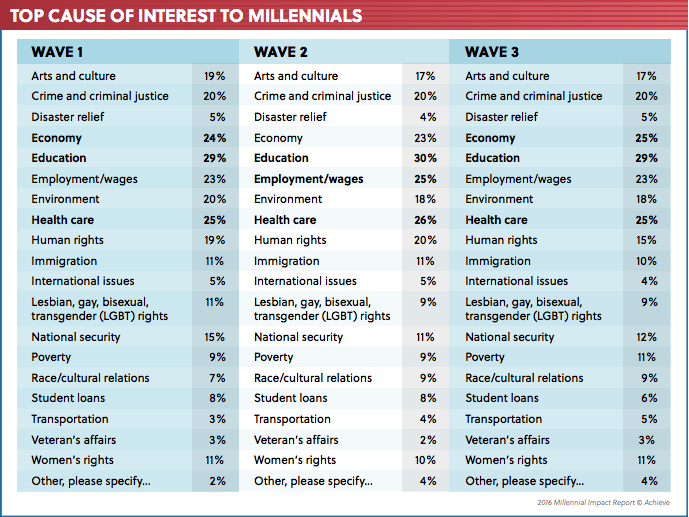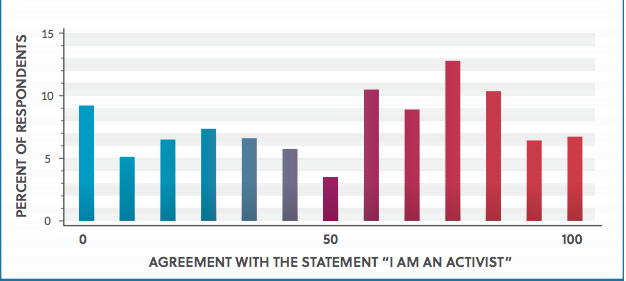Millennials, the demographic of adults born between 1980 and 2000, represent the newest generation of donors, volunteers, advocates, and leaders for your nonprofit or charity.
As a millennial myself, I’ve been somewhat disheartened by the constant onslaught of negative opinions about our generation (how “millennial” of me). We’re generally thought of as entitled, idealistic, and flighty in nature.
We’re known to jump from job to job, brand to brand, and cause to cause without loyalty. On the other hand, studies have also shown we’re passionate, positive, and work well in a team setting. We follow our gut and aim to lead a more fulfilling life.
With such conflicting ideas of who a typical “millennial” really is, it’s great to have a resource like the Millennial Impact Report.
Over the past year, we’ve seen 3 waves of reports covering topics ranging from political leanings to faith in the government and everything in between. And while most of the trends and statistics shared in these studies are related to the 2016 presidential campaign, the findings are absolutely relevant to any charitable organization.
From our own experience at CauseVox, we’ve had thousands of millennials donors, fundraisers, volunteers, and advocates use our platform to help make the world a better place. We’ve seen firsthand just how philanthropic, energetic, and involved this generation can be.
You may be thinking “Why should I care about millennials? We have a large, active donor base of Generation X and Baby Boomers. Millennials don’t fit our demographic.”
To this I say, just wait a few years.
Millennials are the supporters you’ll be relying on in the future to keep your organization funded. We’re your future board members and major donors and it’s vital to understand us and bring us into the fold early on.
“Millennials are your future board members and major donors and it’s vital to understand us…” tweet this
We’re not that complicated. I swear! To prove it, let’s look at some takeaways from the 2016 Trends Reports.
1. Millennials Care About Social Issues
We saw that education and health care remained the first and second-highest social issues of interest for millennials, but employment/wages edged out the economy as the third-highest issue of interest [during Wave 2]. We also learned that there are many social issues that matter to millennials. The millennials surveyed ranked employment, healthcare, employment/wages as their highest priorities.

Findings changed a bit during the Wave 3 research period (September through November), mirroring trends from Wave 1. As we neared the election, millennials shifted their focus back to the economy.
When you consider the state of United States politics and the economy, it’s easy to understand why these social issues matter to young adults. Coming of age in a time of economic depression, our generation has bared the burden of low/underpaid employment and rising costs for higher education and healthcare.
These issues matter to millennials because they hit home. They’re issues many of us are struggling with ourselves.
If your nonprofit or charity works in some of the fields millennials tend to be more passionate about (check out the chart for detailed information), then by all means, reach out to us! We’re likely to understand the cause and want to be part of the solution as a volunteer or even donor.
Takeaway: Show your millennial audience how your cause impacts them and those closest to them.
2. Millennials Still Use Social Media Frequently
Facebook is still the most popular social media platform on which millennials post about issues they care for, and the majority of millennials had posted about an issue on social media in the past week.

We discussed millennial’s social media usage in a previous post, but this is information worth repeating and expanding on.
As you can see from each wave of the 2016 report, millennials use a wide variety of social media platforms, but Facebook, Twitter, Instagram, and YouTube are, overwhelmingly, the preferred platforms for male millennials to post about a cause they care about.
Female millennials take a different approach, with the vast majority using Facebook, and relatively even numbers utilizing the social power of other platforms.

While males are more proactive/responsive in their approach to social issues/causes on social media, this doesn’t mean you should target your posts to a primarily male audience. Remember that women make 64% of all donations. Thus, if you’re marketing a fundraising campaign using social media, stick to Facebook to maximize your reach and potential response.
Takeaway: When marketing your organization to millennials on social media, use Facebook.
3. Millennials Consider Themselves Activists
Millennials still consider themselves activists, but without showing a strong affinity for direct action in support of or opposition to an issue.

More than half of all millennials surveyed consider themselves an activist, meaning your nonprofit or charity must create opportunities for millennials to advocate and act for your cause.
Keep in mind that researchers noted that the label “activist” didn’t necessarily correlate with an affinity for direct action. The problem here may lie in the activism and advocacy opportunities available to millennials.
As I mentioned earlier, millennials may not have the money to give to your cause just yet, but they do have a voice. Thankfully, social media has made it easy (and convenient) for millennials to share your cause with others.
An additional point to keep in mind is the gender disparity when it comes to activism. As you can see from the chart below, males consider themselves activists at higher levels than women. This can be interpreted a number of ways, but it’s important to keep in mind as you brainstorm ways to turn your millennial supporters into activists.

Here are a few ways that you can engage millennials through activism:
-
-
- Hold a peer-to-peer fundraiser or incorporate other People Fundraising techniques to transition your millennials from passive donors to active supporters.
- Make a petition that promotes change and the advancement of the people your cause helps
- Include social sharing buttons on your emails, posts, donation forms, etc.
-
Takeaway: Give your millennial audience a chance to become an activist for your cause.
4. Millennials Engage With Causes They Care About
In the last month, males continued at about the same rate – around half – to participate in an activity related to a social issue they cared about. Participation by females, however, dropped in every participation category from as little as 3 percent to as much as 12 percent.

Again, there is a fairly significant difference between the engagement rates of millennial males and females, with males reporting much higher rates of volunteering, donating, project support, etc.
Aside from this variation, the engagement rates are noteworthy because they’re relatively even across the board. In fact, both males and females report being just as likely to donate to your cause as to support a community project.
I know I promised that we’re not that complicated, but as you can see, there really isn’t a “one-size-fits-all” approach to millennials. We’re interested in getting involved at different levels with various activities.
As a side note, it’s important to note that millennials aren’t ones to engage because of your messaging or branding. Instead, it’s often the influence of their peers that promote action, and that’s one of the reasons why we see millennials as the generation fueling people-based fundraising. Social connections help fuel engagement in the millennial population and this trend is causing a ripple effect throughout the nonprofit world.
Takeaway: Millennials want to be connected to organizations that allow them to take action, so offer a variety of engagement opportunities to reach more millennial supporters.
“Millennials want to be connected to organizations that allow them to take action...” tweet this
As you can see, a vast majority of millennials believe that they can help make the world a better place to live, and your nonprofit or charity can provide them with an outlet to do so.
Start here:
- Cater to the preferred communication styles and engagement trends, including a focus on social media.
- Don’t underestimate the power of transparency. While millennials have hope for the future, we’re also fairly distrustful of the government and leadership in general. If millennials believe you are not being truthful or are reporting inaccurately, you won’t keep their support. Focus on the following to build trust:
- Accurate records and reporting
- Maintaining an informative website and online profiles (think Guidestar and Charity Navigator) that include your tax information
- Sharing real stories and needs in your fundraising appeals
- Start building the relationship now. Millennials care about your cause, and they care about helping to create a positive outcome. Communicate donor impact with your millennial audience often. Let them know how they’re part of the solution.
- Remember that, while they may not be able to shell out hundreds of dollars every year, most millennials are interested in activism and engagement. Therefore, offer:
- Volunteer opportunities
- Networking with other donors
- A chance to engage on another level, such as becoming a peer-to-peer fundraiser
To motivate and engage your millennial audience, start by planning a fundraising campaign they’ll love, such as crowdfunding or peer-to-peer fundraiser. Check out these links for more information on ways to involve millennials in your organization.
- To learn more about cultivating millennial donors: The Indispensable Guide to Nonprofit Donors
- To engage millennials through fundraising: Ultimate Guide To Peer-To-Peer Fundraising
- To recruit millennial volunteers: Finding Nonprofit Volunteers To Support Your Mission




